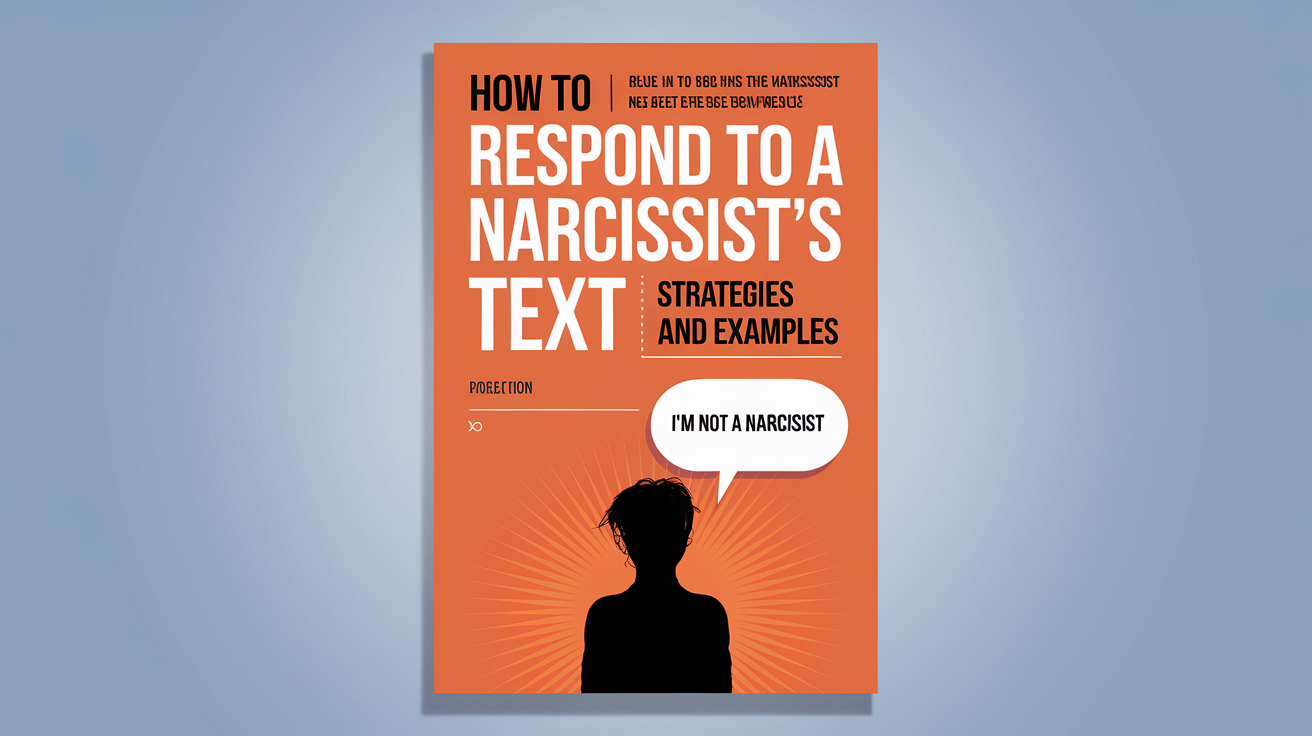Last updated on November 24th, 2024 at 05:50 am
Narcissists can be challenging to deal with, especially through text messages where tone and intent can often be misconstrued.
Understanding their behavior and having effective strategies to respond can help maintain your emotional well-being and avoid unnecessary conflicts
This article will provide detailed strategies and examples to help you navigate texting with a narcissist, covering a wide range of techniques and scenarios.
Understanding Narcissistic Behavior

Respond effectively to a narcissist’s text, you first need to understand narcissistic behavior. Narcissists often display traits such as grandiosity, a need for admiration, and a lack of empathy.
For Example:
If a narcissist texts you with exaggerated praise, such as,You’re the only one who understands me, recognize this as a manipulation tactic rather than genuine appreciation.
Explanation:
Narcissists often use manipulation to maintain control in a conversation. They might use flattery, guilt-tripping, or aggressive tactics to get the reaction they want. .
Recognizing Narcissistic Texts
Narcissistic texts often contain self-centered language, exaggeration, and manipulation. They might focus on their achievements, criticize others, or make you feel guilty.
Explanation:
Responding to such messages requires a clear understanding of your boundaries and the ability to remain emotionally detached from their manipulative tactics.
For Example:
A text like, I don’t know why everyone else is so difficult, only you get me is a classic narcissistic message.
Setting Boundaries with a Narcissist
Setting boundaries is crucial when dealing with a narcissist. Clearly communicate your limits and stick to them.
For Example:
you can say I’m available to talk between 6-8 PM. Outside of these hours, I need time for myself.
Explanation:
Reiterate your boundaries as needed, and don’t be afraid to enforce them if the narcissist tries to overstep.
Responding with Empathy and Calmness
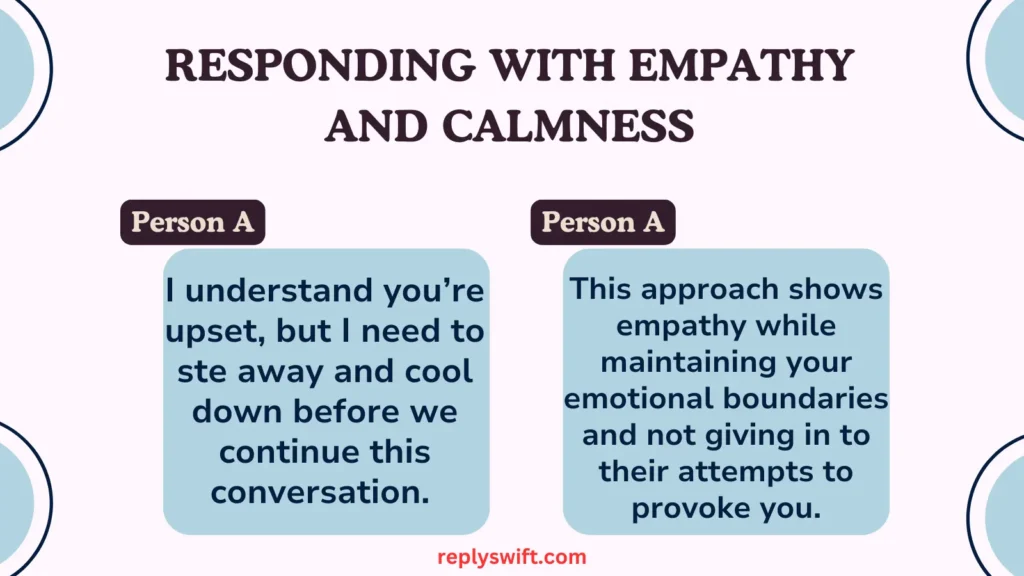
When responding to a narcissist, it’s essential to remain empathetic and calm. Narcissists thrive on emotional reactions.
For Example:
If a narcissist texts you angrily, instead of responding with anger, you could say, I understand you’re upset, but I need to ste away and cool down before we continue this conversation.
Explanation:
This approach shows empathy while maintaining your emotional boundaries and not giving in to their attempts to provoke you.
Avoiding Emotional Triggers
Narcissists often know how to push your emotional triggers to get a reaction. Identifying these triggers and learning to manage them can help you respond more effectively.
For Example:
If a narcissist brings up a sensitive topic to upset you, take a deep breath and respond with a neutral statement like, I’m not comfortable discussing this right now.
Explanation:
By not giving in to their provocations, you maintain control over the conversation and protect your emotional well-being.
Using the Gray Rock Method
The Gray Rock Method involves becoming uninteresting and unresponsive to the narcissist’s manipulations.
For Example:
If a narcissist texts you trying to start an argument, reply with, I understand.
Explanation:
This approach makes it harder for the narcissist to manipulate you and often leads them to seek attention elsewhere.
Maintaining Neutrality in Your Responses
Maintaining neutrality in your responses can prevent a narcissist from using your emotions against you. Keep your messages calm and objective.
For Example:
If a narcissist sends you a provocative text, you can respond with, I see your point, without agreeing or disagreeing.
Explanation:
Over time, consistently neutral responses can reduce the narcissist’s attempts to provoke you.
Avoiding Flattery and Validation
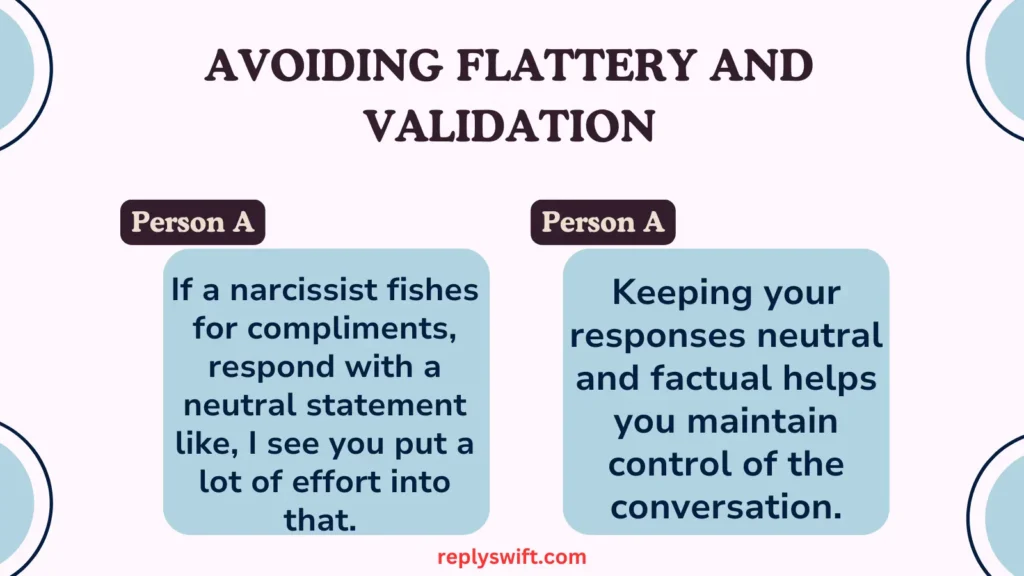
Narcissists often seek flattery and validation. Avoid giving them the satisfaction they crave, as it only reinforces their behavior.
For Example:
If a narcissist fishes for compliments, respond with a neutral statement like, I see you put a lot of effort into that.
Explanation:
Keeping your responses neutral and factual helps you maintain control of the conversation.
Being Assertive Without Being Aggressive
Being assertive is important when dealing with a narcissist, but it’s equally important to avoid aggression.
For Example:
If a narcissist is demanding your time, you can say, I can’t meet today, but I’m available tomorrow at 3 PM.
Explanation:
Maintaining a calm and assertive tone can help you navigate interactions with a narcissist more effectively.
Responding with Short, Direct Answers

Narcissists often try to engage you in lengthy, emotional conversations. Responding with short, direct answers can help you avoid getting drawn into their manipulations.
For Example:
If a narcissist sends a long text about their problems, you can reply with, I’m sorry to hear that. This acknowledges their message without engaging deeply.
Explanation:
Keeping your responses brief and to the point can reduce the narcissist’s influence over you.
Using Humor to Deflect Manipulation
Humor can be a powerful tool to deflect a narcissist’s manipulative attempts.
For Example:
If a narcissist is trying to guilt-trip you, you could respond with a humorous comment like, Nice try, but I’m not falling for that today!
Explanation:
Using humor can help you maintain control of the conversation and prevent the narcissist from getting the reaction they want.
Redirecting the Conversation
When a narcissist tries to steer the conversation towards their interests or manipulations, you can redirect the conversation to a more neutral or positive topic.
For Example:
If a narcissist starts complaining about their day, you can say, That sounds tough. By the way, did you see the game last night?
Explanation:
Redirecting the conversation helps you avoid getting drawn into their negativity and keeps the interaction more balanced.
Avoiding Personal Attacks
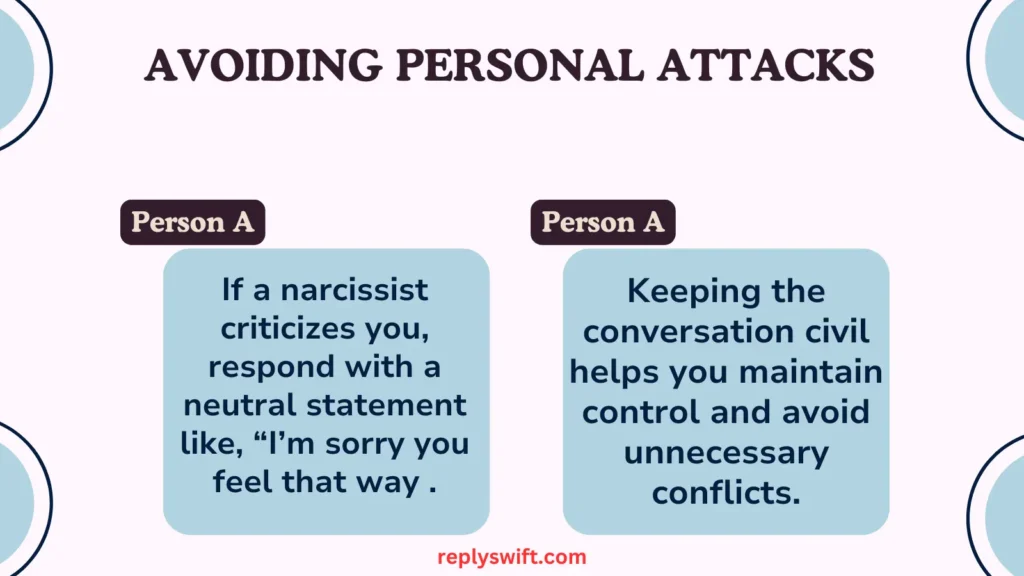
Avoiding personal attacks is crucial when dealing with a narcissist. Personal attacks only escalate the situation and give the narcissist more ammunition to use against you.
For Example:
If a narcissist criticizes you, respond with a neutral statement like, “I’m sorry you feel that way .
Explanation:
Keeping the conversation civil helps you maintain control and avoid unnecessary conflicts.
Keeping Your Responses Factual
Keeping your responses factual can help you avoid emotional manipulation. Stick to the facts and avoid getting drawn into emotional arguments.
For Example:
If a narcissist accuses you of something, respond with, Actually, here are the facts. and provide objective information.
Explanation:
Factual responses make it harder for the narcissist to twist your words and manipulate the conversation.
Knowing When to Not Respond
Sometimes, the best response is no response at all. Knowing when to not respond can help you maintain your emotional well-being and avoid unnecessary drama.
For Example:
If a narcissist sends you a provocative text, consider whether responding will benefit you or just escalate the situation.
Explanation:
Not responding shows the narcissist that their tactics won’t always work on you.
Protecting Your Emotional Well-being
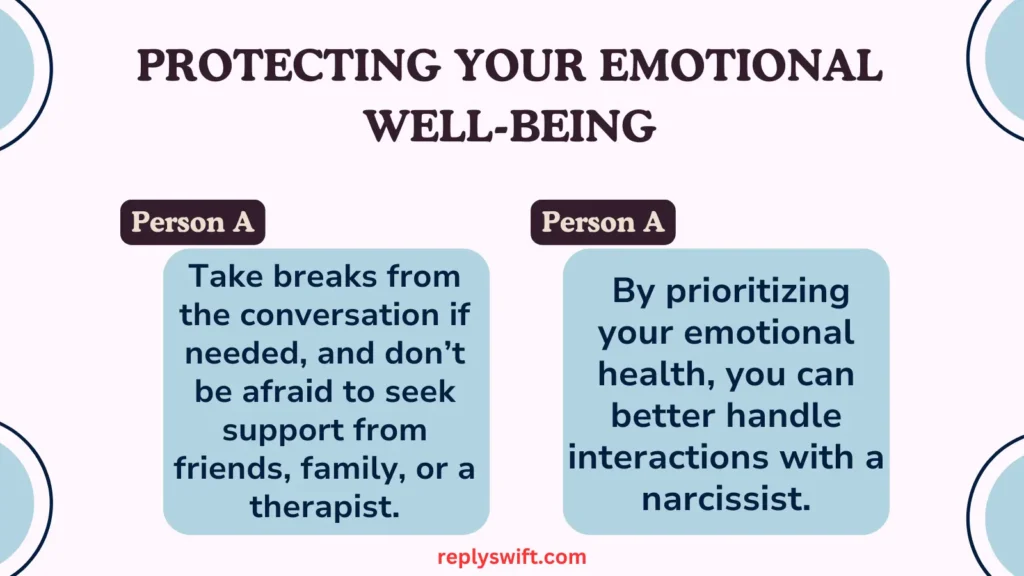
Protecting your emotional well-being is paramount when dealing with a narcissist. Prioritize your mental health and take steps to ensure you’re not overwhelmed by their behavior.
For Example:
Take breaks from the conversation if needed, and don’t be afraid to seek support from friends, family, or a therapist.
Explanation:
By prioritizing your emotional health, you can better handle interactions with a narcissist.
Establishing Clear Communication Rules
Establishing clear communication rules can help manage interactions with a narcissist. Set guidelines for how and when you will communicate.
For Example:
you can say, I’m not available to text after 9 PM. This sets a clear boundary and helps you control the flow of communication.
Explanation:
Clear rules make it easier to manage the narcissist’s attempts to dominate your time and attention.
Handling Gaslighting Tactics
Gaslighting is a common tactic used by narcissists to make you doubt your reality. Recognizing and responding to gaslighting tactics is crucial.
For Example:
If a narcissist tries to gaslight you, respond with, I remember things differently, and I trust my memory.
Explanation:
Standing firm in your perception helps you resist the effects of gaslighting.
Responding to Blame Shifting
Narcissists often shift blame to avoid responsibility. Recognizing and addressing blame shifting is important.
For Example:
Holding your ground helps you avoid being manipulated into taking responsibility for things that aren’t your fault.
Explanation:
If a narcissist blames you for something, respond with, I understand you’re upset, but this isn’t solely my responsibility.
Dealing with Narcissistic Rage
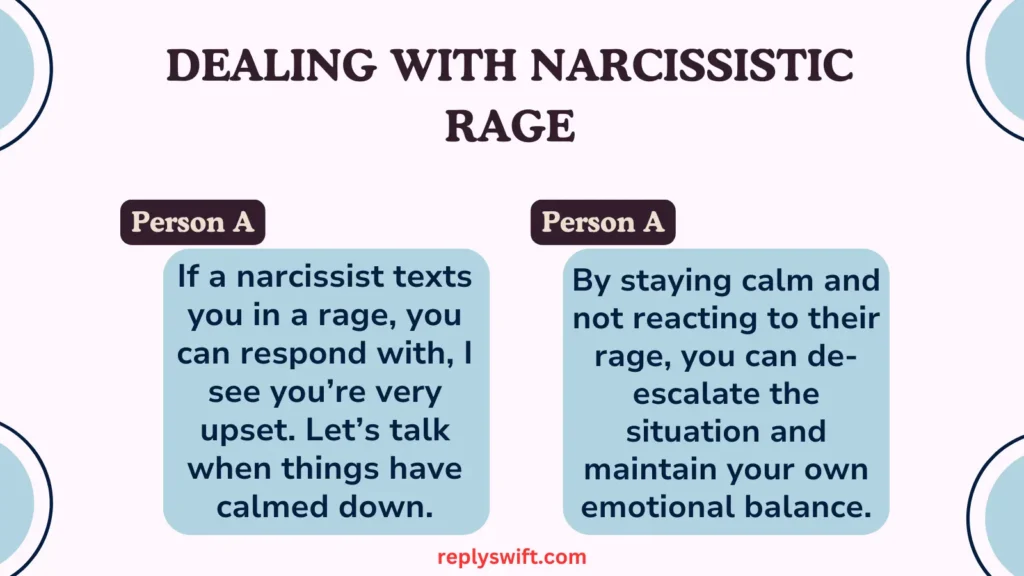
Narcissistic rage can be intense and overwhelming. Knowing how todeal with narcissistic rage can help you protect yourself from emotional harm.
For Example:
If a narcissist texts you in a rage, you can respond with, I see you’re very upset. Let’s talk when things have calmed down.
Explanation:
By staying calm and not reacting to their rage, you can de-escalate the situation and maintain your own emotional balance.
Managing Silent Treatment Tactics

The silent treatment is a passive-aggressive tactic often used by narcissists to manipulate and control you. Recognizing and managing this behavior is essential.
For Example:
If a narcissist suddenly stops responding to your texts, don’t panic or become overly eager to get a response. Instead, give them space and continue with your own activities.
Explanation:
By not reacting to the silent treatment, you show the narcissist that their tactic won’t affect you as intended.
Responding to Love Bombing
Love bombing involves excessive flattery and attention to manipulate and control. Recognizing love bombing can help you respond appropriately.
For Example:
If a narcissist bombards you with compliments, you can respond with, Thank you for your kind words. Let’s keep things balanced.
Explanation:
Balancing your responses helps you maintain perspective and avoid falling into their trap.
Handling Grandiosity and Self-Importance
Narcissists often display grandiosity and self-importance. Managing this behavior requires patience and a strategic approach.
For Example:
If a narcissist texts you bragging about their achievements, you can reply with, That’s interesting. How does it impact our plans?
Explanation:
By not feeding into their self-importance, you keep the conversation grounded and relevant.
Using ‘I’ Statements to Express Yourself
Using ‘I’ statements can help you communicate your feelings without sounding accusatory, which can be crucial when dealing with a narcissist.
For Example:
If a narcissist’s behavior bothers you, you can say, I feel uncomfortable when our conversations are one-sided. Can we talk about both our interests?
Explanation:
‘I’ statements help you assert yourself while minimizing conflict.
Knowing Your Triggers and Preparing Responses
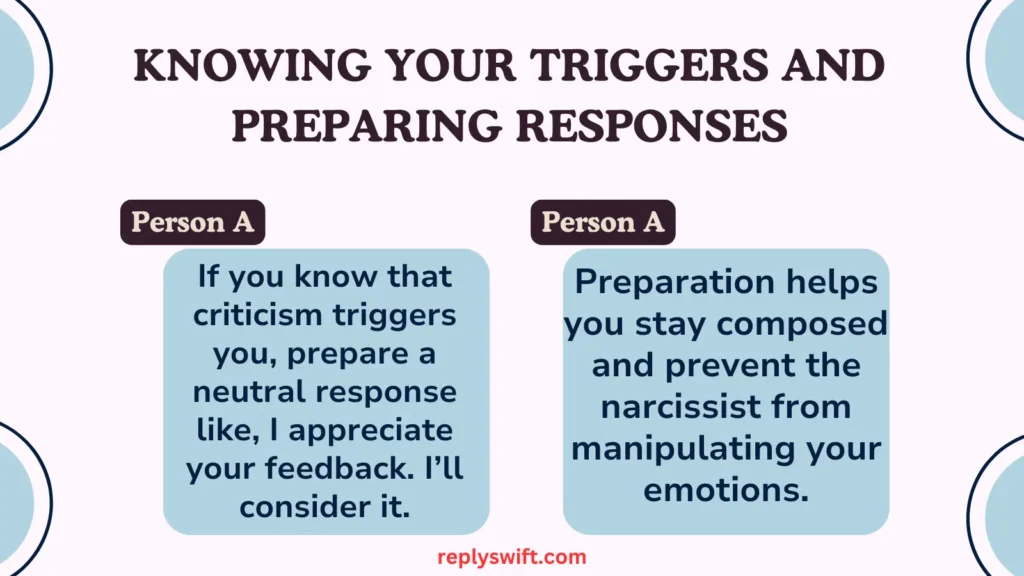
Understanding your own triggers can help you prepare effective responses and maintain control in conversations with a narcissist.
For Example:
If you know that criticism triggers you, prepare a neutral response like, I appreciate your feedback. I’ll consider it.
Explanation:
Preparation helps you stay composed and prevent the narcissist from manipulating your emotions.
Taking Breaks from Conversations
Taking regular breaks from conversations with a narcissist can help you maintain your emotional well-being and perspective.
For Example:
If a conversation becomes too intense or overwhelming, it’s okay to step away. You can say, I need a break. Let’s continue this later.
Explanation:
Breaks help you avoid burnout and maintain your emotional resilience.
Getting Support from Trusted Friends and Family
Seeking support from trusted friends and family can provide you with perspective and emotional strength when dealing with a narcissist.
For Example:
Talk to people who understand your situation and can offer advice or simply listen. Sharing your experiences can help you feel less isolated and more empowered.
Explanation:
Support networks are invaluable for maintaining your emotional health and gaining insights into managing a narcissist.
Seeking Professional Help When Needed
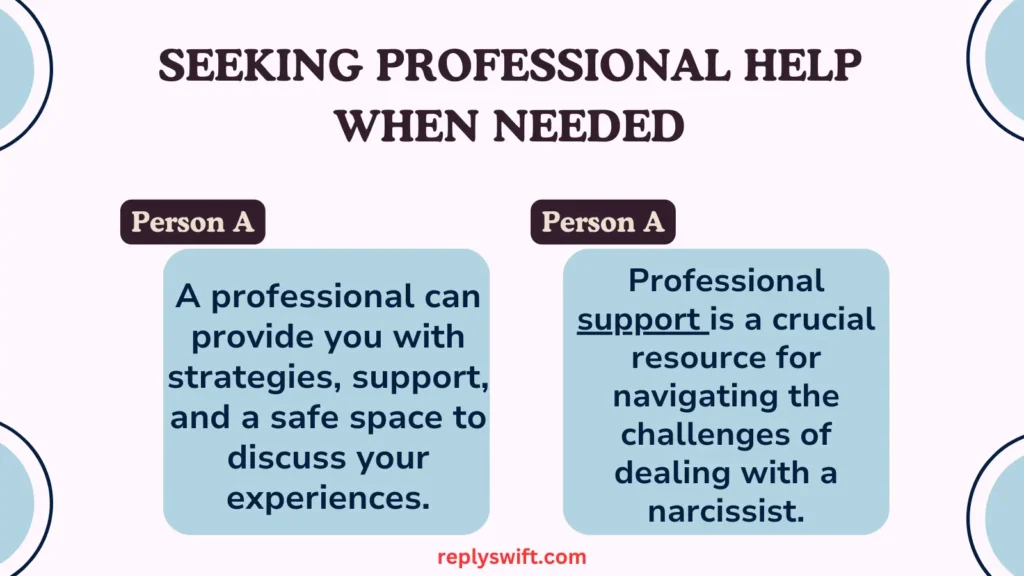
Sometimes, professional help is necessary to deal with the complexities of interacting with a narcissist. Don’t hesitate to seek therapy or counseling if needed.
For Example:
A professional can provide you with strategies, support, and a safe space to discuss your experiences.
Explanation:
Professional support is a crucial resource for navigating the challenges of dealing with a narcissist.
Learning to Recognize When to Walk Away
Knowing when to walk away is one of the most important skills in dealing with a narcissist. Sometimes, the healthiest choice is to remove yourself from the situation entirely.
For Example:
I don’t think this conversation is productive for either of us. I need to take a step back.
Explanation:
Walking away can protect your mental health and set a strong boundary.
Empowering Yourself with Knowledge and Strategies
Empowering yourself with knowledge and strategies is key to effectively managing interactions with a narcissist.
For Example:
Continue learning about narcissism and refining your strategies. Books, articles, and support groups can provide valuable insights and tools.
Explanation:
Empowerment comes from knowledge, preparation, and self-care, enabling you to handle narcissistic interactions with confidence.

James Wilson is the creative mind behind ReplySwift.com. With a talent for crafting quick and clever responses, James helps others communicate more effectively. On ReplySwift.com, he shares tips, templates, and insights to make every reply impactful and engaging. Join James and elevate your response game to new heights.
